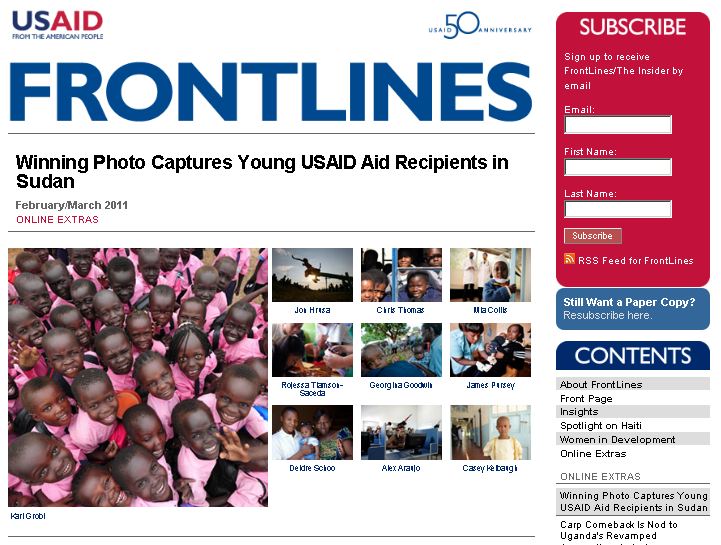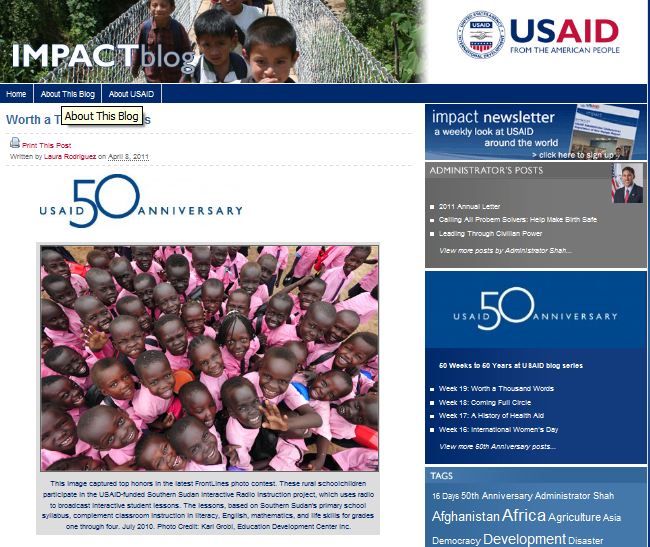Yesterday, I was surfing the internet on a 3G USB stick, while taking a bus from Hanoi to Halong Bay when I received some great news via email.
Education Development Center, one of my major clients, for whom I’ve shot jobs in Afghanistan, The Philippines, Mali, Sudan and just about everywhere in-between, emailed me saying that I’ve won the 2011 USAID Frontlines Photo Contest. Obviously, I was delighted, so I wanted to share the good news.
Here’s the official information from USAID’s website.
The second FrontLines photo contest is over and the top prize goes to Karl Grobl, a photojournalist hired by Education Development Center Inc. (EDC) to document its USAID-funded programs in Sudan.
The winning shot features beaming schoolchildren who participate in the Southern Sudan Interactive Radio Instruction (SSIRI) project, which uses radio to broadcast interactive student lessons. The lessons are designed to complement Southern Sudanese primary school classroom instruction.
I made the winning image with my 17-35 f2.8 by holding it above my head and pointing down onto the children, who instinctively looked up. The sea of smiling faces was one of my favorite images of my work in Sudan for EDC. Below, I’m including some information about EDC and about the job I shot for them…
Here’s a recent use of the image on USAID’s Impact blog:
A bit of background about Sudan. Sudan gained independence from the UK in 1956. After independence, Sudan was embroiled in two prolonged civil wars during most of the remainder of the 20th century. The first civil war ended in 1972 broke out again in 1983.
The second war and famine resulted in more than 4 million people displaced and according to estimates, more than 2 million deaths over a period of two decades. Peace talks gained momentum in 2002 and 2004 with the signing of several accords. The final north-south Sudan comprehensive peace agreement signed in January 2005 granted the southern rebels autonomy for six years. After which, a referendum for independence is scheduled to be held. A separate conflict also broke out in the western region of Darfur in 2003, which has displaced nearly 2,000,000 people and caused an estimated 200,000 to 400,000 deaths. The UN took command of Darfur peacekeeping operation from the African Union on 31 December 2007. As of early 2009 peacekeeping troops were struggling to stabilize the situation. Sudan also has faced large refugee influx is from neighboring countries primarily Ethiopia and Chad.I was to document the Eduction Development Center’s Southern

Sudan Interactive Radio Instruction (SSIRI) program. SSIRI designs, develops, and broadcasts cost-effective instructional programmes to provide learning opportunities for children, adults, and teachers in southern Sudan. SSIRI is an integral part of the Ministry of Education, Science and Technology. The core programmes consist of daily half-hour broadcasts for children in primary school for grades 1-4. In addition, there is also a series for teaching English to youth and adults from beginner to advanced levels. Also, there is a series on classroom management to strengthen teacher skills. Finally, SSIRI supports computer centres with internet access at teacher training institutes and a secondary school. SSIRI was created by the Education Development Center (EDC) International Development Division (IDD) with funding from the United States Agency for International Development (USAID).
The SSIRI programme for primary schools teaches English literacy, indigenous language literacy, mathematics, and life skills such as health topics, peace education, and mine awareness. It aims to complement the teacher’s work in the classroom. The project staff says that the programme functions like another, skilled teacher in the room. It has the dual goal of promoting new teaching strategies for the teacher, while also leading the children in exercises that support active learning, reinforce key concepts, and make learning fun.
The lessons use a combination of games, songs, and stories to introduce educational content. In the programmes, a radio teacher named “Madame Rhoda” instructs the classroom teacher to invite participation by having students answer questions aloud and write on the chalkboard or, in lieu of a chalkboard, in the dirt. A cast of five additional radio characters leads other exercises where students sing songs and respond aloud to questions or statements. The broadcasts also instruct teachers to include girls and boys in the activities equally, which, according to the organisers, is a significant departure from traditional classroom practice.
For the participating schools and adult learning centres, the project provides radio broadcasts, solar-powered and wind-up radios, teachers’ guides, and initial training for teachers. In addition, the project has a cadre of outreach coordinators who train teachers on how best to use and care for the radios and to integrate the programmes into the school day. The project has also developed basic monitoring and evaluation tools to track the impact of the programmes, such as attendance sheets, classroom observation forms, and pre- and post-tests for pupils.
The programmes are broadcast on FM stations throughout Southern Sudan. In addition, for those located in areas that cannot receive the radio broadcasts, EDC and the Ministry are delivering the programmes using digital devices ranging from MP3 players to boom boxes using solar panels or hand-cranking devices to recharge batteries. As of February 2010, over 70,000 children receive the programmes in six states in southern Sudan as well as Blue Nile and Southern Kordofan. In addition, over 300,000 youth and adults receive the English and primary school programmes in their homes.
The program aims to reach schools, often with no classrooms or desks, and to support the great majority of teachers who are not trained. According to the organisers, “In some parts of southern Sudan, school consists of one teacher, 80 students, and the shade provided by some trees. In others, children gather for school in a small hut or ‘tukul’ made from mud bricks and thatch, with no electricity or running water. Teachers might have chalk and a chalkboard, but books, paper, and pencils are rare.”
Here are a few other blog posts from my assignments in Sudan for EDC
http://karlgrobl.com/blog/2010/07/assignment-education-development-center-juba-sudan/
http://karlgrobl.com/blog/2010/07/sudan-assignment-continues-edc-ssiri-project/
















Congrats to you, Karl! Your award winning style always captures stunning images, wish I was there to share a cold Saigon Special with you to celebrate.
Hey Karl,
Congratulations on winning this contest.
For those who should doubt about it, you’re the best!
Keep up the good work.
Love your photography.
Greetings,
Danny Verhasselt
BELGIUM
Way to go Karl! Great photo and well deserved win!
Terry
Congrats Karl! No one deserves this award and recognition more than you!
Congratulations Karl. Great shot and a well deserved win.
Hi Bob,
Thanks for the congratulatory message and thanks so much for letting me borrow your D300; it has been performing flawlessly. I don’t know what I would have done without it, you’re a life-saver.
I hope your editing is going well. Cheers, Karl
Congratulations Karl — great image!
An amazing image truly capturing the intent of the service
well done and well deserved
Tim
Way to go, Karl.
Great image and well deserved.
Many Kudos!
Susan Woog Wagner
Congratulations, Karl! Well deserved recognition!
Awesome!! Congrats on your award, Karl! Great picture, keep up the good work. Hope all is well.
Very proud of being your friend Karl! Congrats on another prize. Can’t wait to go on a tour with you again.
Gustavo
An absolutely great and fantastic photo. Congratulations on a well deserved award. Now, how can I get a copy of this image–sea of smiling faces from the Sundan? Thanks.
Hello Karl,
Was just checking out your site and noticed your winning photo. Very nice indeed. Congratulations.
Hi Karl,
Just noticed your Frontlines winning entry. Very nice indeed. Congratulations.
Thanks Sheila!